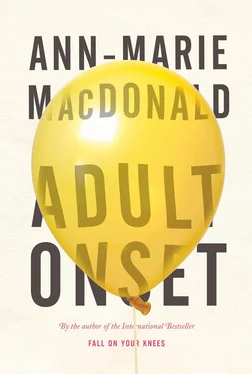“Oh, that’d be lovely!” she groaned, and they stepped into the Starbucks.
They found a table by the steamy window that was stencilled with non-denominational snowflakes. A sleek young man in signature green apron approached their table with a tray. “Would you like to sample a mini-cup of our festive chocolate peppermint candy cane holiday whip?”
“Golly Moses!” said Dolly, and knocked one back.
The young man offered her another.
“You’re bad!” she giggled.
“Sister, you got that right!”
She downed the second one — her blood sugar had to be going through the roof — then ordered the real thing.
“Can I get your name for the cup?”
“It’s Dolly.”
“Well hello, Dolly,” he said.
On cue, they belted out the first few bars together. Customers nearby applauded. He told Dolly what he was studying, where his parents were from, he told her about his bee sting allergy, and before Mary Rose knew it, he was calling her Sitdy and hugging her. Another lucky winner in the instant intimacy sweepstakes. Mary Rose sat on the sidelines with her tall, humourless no-foam latte.
Though she often felt like a killjoy in her presence — spectre at the feast, ghost of murdered Banquo — Mary Rose was nonetheless proud of her mother’s ability to connect with people. Stewardesses sent her photos of their babies. Cops smiled at her, she got a few dollars off everything.
“You’re not eighty!” the young man exclaimed.
“I’m eighty-one,” declared Dolly with mock solemnity.
He told her how close he had been to his grandmother who had come here from the Philippines and raised five children from behind the cash register of a corner store. Dolly told him the story of how her father had sold dry goods from a donkey in the back country of Cape Breton Island, of how he had eloped with her mother. The young man had tears in his eyes. Mary Rose thought, but did not say, “I’ll give you something to cry about, buddy, my grandmother was twelve.”
The young man slipped away but soon returned with a grande version of the mini-cup — that was another thing: Dolly got table service at Starbucks. Mary Rose took one look at the candy-striped confection and wondered if she would recognize the signs of diabetic shock. What if her mother went into a coma? Collapsed? Died at Starbucks? Can I get your name for the gravestone?
The young man said, “My name is Daniel? So just let me know if there’s anything else you need, okay?” He withdrew, and Dolly leaned confidingly over her minaret of whipped cream. “Now that young fella is gay, is that right?”
“That’s right, Mum, in all likelihood.”
“I love you, doll.”
Mary Rose felt guilty for not feeling warm and happy. Instead of melting into a smile, she felt her face go positively Soviet in a pre-glasnost kind of way. She knew she looked like Brezhnev and there was nothing she could do about it. If she rummaged in her basement, she could probably find the box marked WARM AND HAPPY. But who knew what else might be down there, she didn’t have time to go through it all. Nyet . She hesitated. Was it worth it to disturb the peace? On the other hand, her mother had raised the subject … maybe she wanted to talk about it. Fill in the missing bit. In movies, this was the poignant conversation that led to “closure.”
“It was hard before you … arrived at that.” She sounded like a robot in her own ears.
Dolly looked at her quizzically. “It was?” Head cocked, like Daisy.
Dolly’s expressions were often like caricatures of real expressions; as if she was in constant clown mode. Larger than life. But, Mary Rose wondered now, what’s wrong with life-sized? What remains when the trumpets and bells fall silent and the ringmaster sets down his megaphone? When the dancer pulls the red shoes from her bloodied feet?
“Yes,” said Mary Rose.
“Why? What did I do?”
This café table was a world away from the kitchen table of yore, and yet she was still … anaesthetized. There must be considerable emotion collecting within her somewhere — as with fluids in a corpse. “You wouldn’t set foot in my home. Remember?” She felt like she was lying. It wasn’t that the words she was saying were untrue; it was the fact of her speaking them at all. “And you wouldn’t have Renée in your home, remember?”
Dolly looked perplexed.
Coffee table, kitchen table, operating table … like a Sesame Street song, one of these tables is not like the others …
“You said some bad things,” said Mary Rose. Her hands were cold. She had stumbled into a chilly gap in time.
“I did? What did I say?”
I would rather you had cancer .
There was no point speaking the words, they were only sounds and might wound her mother unnecessarily.
I didn’t give you shit to eat …
“Mum?”
“Yes, doll?” Dolly leaned forward and placed her hand in the centre of the table. Brown and still smooth, it was an old hand now, exquisitely veined; hard-working but fine. Mary Rose loved this hand. It was somehow like a whole other mother. As if her mother had two faces, and this hand was one. The real one. What would it say? Did it remember? Mary Rose was suddenly alive again, no longer a puppet under a spell, she had a lump in her flesh-and-blood throat. She wanted to lay her face on that hand, feel it turn and cup her cheek in its palm, and take the weight of her head. Tears welled up and, rather than trickling down, they stood, liquid lenses whose function seemed to be to impart acuteness to her vision, for it was then that she noticed: “Mum? Where’s your moonstone?”
Dolly looked at her hand, alarmed. “Golly Moses!” And lurched to look beneath the table — a thousand calories leapt from her cup and she nearly tumbled from the chair.
“Mum!”
“I must’ve dropped it.”
“It’s okay, I’ll look.”
Mary Rose got up, already scanning the floor.
The server was on them. “Did you lose something?”
“It’s okay,” she said.
“It’s not okay!” cried Dolly, and the cry pierced Mary Rose’s heart.
She was shocked to find herself in danger of sobbing at the pathos: the moonstone ring that her father had given her mother way back in Germany during the sweet years, the years of Rhine and roses … kicking around now on the floor of the Starbucks. Or lodged in a sidewalk crack between here and home, on its way back, back, back … She bit the inside of her cheek and blinked away the blur.
“What did you lose?” asked lovely gay Daniel.
“My ring!” moaned Dolly. “My husband gave it to me when our son was born.”
“That sounds really special.”
“It is really special, he died.”
Dolly sounded like a first-grader pleading for help in sorting out what and how much she felt: Is this too much? What if it spills on the way home?
“I’m so sorry, why don’t you leave me your number and if anyone finds it, I promise—”
Dolly was already emptying her purse onto the table. Mary Rose looked away, grey in the soul, and headed for the door, eyes on the floor, unable to bear her mother’s frank distress, desperate to recover it — stone marker for a dead baby gone to grass long ago in another land across the sea, now it was lost and the genie was out. Memory was zooming around Starbucks like a bird trying to escape, bang against the glass … Bang bang!
“I found it!”
She turned. Her mother was smiling broadly, holding the small grey velvet box.
“It was in my purse!”
Daniel embraced Dolly and she held him and patted his back like a baby.
Mary Rose returned to the table, oddly drained, revisited by the sense that half of her had shut down. The humorous half. Humerus . She should be the one embracing her vibrant mother, mirroring the ups and downs; after all, a diva is just an extroverted martyr. But Mary Rose was brittle. Bag of bones. She sat back down at the table. Shclink went the bones.
Читать дальше












